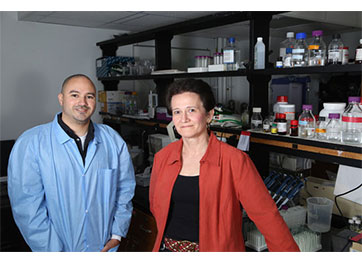
Luis Martinez and Maria V. Tejada-Simon, University of Houston
Caption: Martinez reviews his poster presentation in the lab with Tejada-Simon ahead of the Experimental Biology meeting in San Diego. (Credit: Kris Kehe)
Fragile X Syndrome (FXS) is an inherited cause of intellectual disability, especially among boys. It results in a spectrum of intellectual disabilities ranging from mild to severe, as well as physical characteristics, such as an elongated face, large or protruding ears, and large testes. Accompanying behavioral characteristics include stereotypic movements, such as hand-flapping, and social anxiety.
Cognitive impairment in neurodevelopmental disorders like FXS is thought to be due to abnormal neuroplasticity, developmental changes in the brain, which alters synaptic connections. Previous research has suggested that a specific protein in the hippocampus, considered the "seat" of learning and memory, does not migrate to the appropriate spot in mouse models of FXS versus wild-type mice.
Work by Tejada-Simon's lab, as well as other researchers, have found that Rac1 (a protein of the Rho family) plays an important role in synapse formation, with an abnormally high number of synapses occurring in FXS mouse models following the newborn-to-juvenile developmental stages.
"During their developmental aging and growth into juvenile stage, the FXS mouse model – in which Rac1 expression is up-regulated – fail to undergo 'pruning' of the surplus of synapse neural connections," said Martinez, who earned a double-major B.S. in Biology and Biochemistry from UH in 2005. "Yet, we found that by pharmacologically inhibiting Rac1 to prevent its activation and membrane translocation, we were able to rescue cognitive function to improve their learning and memory skills."
Following peer review of Martinez's poster abstract submission, titled "Correcting memory deficits in Fragile X syndrome by targeting Rac1/PAK1 signaling," he was invited to also present their findings in an oral presentation at the Julius Axelrod Symposium, New Vistas on Drug and Gene Therapies of Cognitive Deficits in Down Syndrome, Autism, Leucodystrophies and Alzheimer's Disease. The symposium oral presentation and the poster presentation sessions are both part of the American Society for Pharmacology and Experimental Therapeutics’ annual meeting, held in conjunction with the Experimental Biology conference.
To support his attendance and research presentations, Martinez received a 2016 Federation of American Societies for Experimental Biology (FASEB) Maximizing Access to Research Careers (MARC) Program Travel Award and complementary meeting registration.
Martinez is one of 49 students, post-doctoral fellows and scientists to receive a travel award to the meeting through the program, funded by a grant from the NIH’s National Institute of General Medical Sciences. A primary goal of the program is to increase the number and competitiveness of underrepresented groups engaged in biomedical and behavioral research.
One of the largest gatherings of its kind, Experimental Biology is an annual meeting comprising more than 14,000 scientists, undergraduate and graduate students, postdoctoral fellows and exhibitors representing six sponsoring societies and multiple guest societies.
FASEB is composed of 30 societies with more than 125,000 members, making it the largest coalition of biomedical research associations in the U.S. The organization's mission is to advance health and welfare by promoting progress and education in biological and biomedical sciences through service to its member societies and collaborative advocacy.
###
Editor’s note: Story courtesy of Chip Lambert, College of Pharmacy
About the University of Houston
The University of Houston is a Carnegie-designated Tier One public research university recognized by The Princeton Review as one of the nation’s best colleges for undergraduate education. UH serves the globally competitive Houston and Gulf Coast Region by providing world-class faculty, experiential learning and strategic industry partnerships. Located in the nation’s fourth-largest city, UH serves more than 42,700 students in the most ethnically and culturally diverse region in the country. For more information about UH, visit the university’s newsroom.
About the UH College of Pharmacy
For more than 65 years, the University of Houston College of Pharmacy (UHCOP) has shaped aspiring pharmacists, scientists and researchers. The college offers graduate degrees in pharmacy administration, pharmacology and pharmaceutics, a professional pharmacy degree, combined professional/graduate degrees, and post-graduate residency and fellowship programs. With facilities on the UH campus and in the Texas Medical Center, the UHCOP is accredited by the Accreditation Council for Pharmacy Education.
To receive UH science news via email, sign up for UH-SciNews.